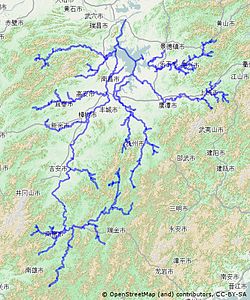This is an old revision of this page, as edited by Lieutenant of Melkor (talk | contribs) at 20:45, 26 April 2014 (restore sources). The present address (URL) is a permanent link to this revision, which may differ significantly from the current revision.
Revision as of 20:45, 26 April 2014 by Lieutenant of Melkor (talk | contribs) (restore sources)(diff) ← Previous revision | Latest revision (diff) | Newer revision → (diff)| This article does not cite any sources. Please help improve this article by adding citations to reliable sources. Unsourced material may be challenged and removed. Find sources: "Gan River" – news · newspapers · books · scholar · JSTOR (December 2009) (Learn how and when to remove this message) |
| Gan River | |
|---|---|
 | |
| Physical characteristics | |
| Mouth | Lake Poyang |
| Length | 885 km (550 mi) |
The Gan River (simplified Chinese: 赣江; traditional Chinese: 贛江; pinyin: Gàn Jiāng, Gan: Kōm-kong) travels 885 km (550 mi) north through Jiangxi before flowing into Lake Poyang and thence into the Yangtze River. The Xiang-Gan uplands separate it from the Xiang River of neighbouring eastern Hunan.
It is the major geographical backbone of Jiangxi, and gives its name to the Gan language as well as the province's one-character abbreviation.
The river feeds into Lake Poyang, which in turns connects with the Yangtze.
Tributaries
See also
| Jiangxi topics | |
|---|---|
| Nanchang (capital) | |
| General | |
| Geography | |
| Education | |
| Culture | |
| Visitor attractions | |
29°44′51″N 116°12′42″E / 29.74750°N 116.21167°E / 29.74750; 116.21167
This Jiangxi location article is a stub. You can help Misplaced Pages by expanding it. |
- Carol Benedict (2011). "Chinese Tobacco Production, 1600 to 1750". Golden-Silk Smoke: A History of Tobacco in China, 1550–2010. University of California Press. p. 41.
- James Stuart Olson (1998). An Ethnohistorical Dictionary of China. Greenwood Press. p. 80.
- Stephen Turnbull (2002). "A Case Study of Chinese Fighting Ships". Fighting Ships of the Far East (1): China and Southeast Asia 202 BC-AD 1419. Osprey Publishing. p. 37.